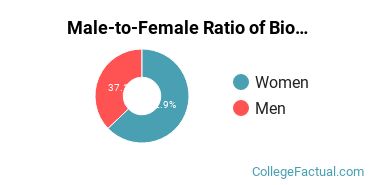 by our College Data Analytics Team
by our College Data Analytics TeamThe main focus area for this major is Bioengineering & Biomedical Engineering. For more details on this concentration, visit its profile page.
Biomedical Engineering is a major offered under the engineering program of study at Yale University. Here, you’ll find out more about the major bachelor’s degree program in bio engineering, including such details as the number of graduates, diversity of students, and more.
You can jump to any section of this page using the links below:
In order to help students and their parents find the best school for them, we have created several different types of college rankings, which are updated yearly. The bio engineering major at Yale is not ranked on College Factual’s Best Colleges and Universities for Bio Engineering. This could be for a number of reasons, such as not having enough data on the major or school to make an accurate assessment of its quality.
Here are some of the other rankings for Yale.
The following table shows the average full-time tuition and fees for undergraduates.
| In State | Out of State | |
|---|---|---|
| Tuition | $57,700 | $57,700 |
| Books and Supplies | $1,000 | $1,000 |
| On Campus Room and Board | $17,200 | $17,200 |
| On Campus Other Expenses | $3,470 | $3,470 |
Learn more about Yale tuition and fees.
Online degrees for the Yale bio engineering bachelor’s degree program are not available at this time. To see if the school offers distance learning options in other areas, visit the Yale Online Learning page.
Women made up around 53.3% of the bio engineering students who took home a bachelor’s degree in 2019-2020. This is higher than the nationwide number of 49.9%.

Around 46.7% of bio engineering bachelor’s degree recipients at Yale in 2019-2020 were awarded to racial-ethnic minorities*. This is higher than the nationwide number of 39%.

| Race/Ethnicity | Number of Students |
|---|---|
| Asian | 1 |
| Black or African American | 2 |
| Hispanic or Latino | 3 |
| Native American or Alaska Native | 0 |
| Native Hawaiian or Pacific Islander | 0 |
| White | 4 |
| International Students | 4 |
| Other Races/Ethnicities | 1 |
Biomedical Engineering students may decide to major in one of the following focus areas.
| Focus Area | Annual Graduates |
|---|---|
| Bioengineering & Biomedical Engineering | 15 |
You may also be interested in one of these majors related to biomedical engineering.
| Related Major | Annual Graduates |
|---|---|
| Chemical Engineering | 10 |
| Electrical Engineering | 6 |
| Engineering Physics | 3 |
| Engineering Science | 33 |
| Environmental Engineering | 5 |
*The racial-ethnic minorities count is calculated by taking the total number of students and subtracting white students, international students, and students whose race/ethnicity was unknown. This number is then divided by the total number of students at the school to obtain the racial-ethnic minorities percentage.
More about our data sources and methodologies.